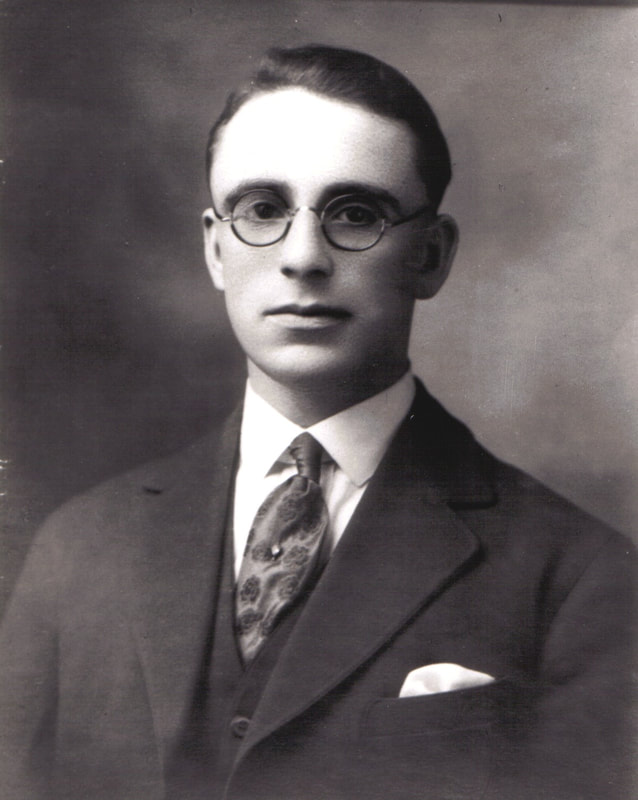BHCARA Winter 2017/2018 Newsletter's Featured BHC
Leslie Henry Baden Fielding
DISCOVERING THE STORY OF FATHER By John Fielding -
Retired Adjunct Professor, Faculty of Education, Queen's University, Canadian and World Studies Curriculum
|
Most children learn about their parents through stories told by their parents. That was true for the Fielding children, of which I was eighth-born of twelve. What was different about the story of our father, Leslie Henry Baden Fielding, the youngest child of Herbert Henry Fielding and Eliza Smith Fielding, however, was its vagueness and strange words: "home children" and "Barnardo." Father was one of almost 100,000 children sent to Canada from the United Kingdom between 1867 and 1939.
|
Most of these children were referred to as "Barnardo children," but only about 30,000 of home children actually were. As many as 50 UK agencies sent children to Canada, many without the knowledge or permission of their parents, a move made legal by the British Parliament. The idea was conceived in 1826 by Robert Chambers, an obscure police magistrate who proposed his plan to British Parliament that "children who cluttered the streets of London could be gathered up and shipped to Canada." My dad and mom with their twelve offspring have made a significant contribution to the estimated three million or 11.5 percent of Canada's population made up of home children and their descendants.
Dad's stories included his being abandoned by his red-haired mother after they entered the Hackney Workhouse. She had promised to return for him, but after a year he was given the choice of being sent to Australia, where he would see kangaroos, and Canada, where he would see cowboys and Indians. He chose cowboys and Indians. He did not think he had any brothers or sisters. He never spoke of his childhood, except to say that he was bullied in the orphanage.
After arriving in Canada, he was sent to Stratford, and from there was sent to work on a farm near Mitchell. He remembered that at this first placement he was not sent to school and had to live in the barn with the animals. He also told the story of how on Christmas Day the neighbours, the Peppers, (it was only Mr. Pepper who was the sheriff) saw a light in the barn, and since the people who owned the barn were away, they came to explore, only to find my dad, all alone, huddled near a lantern to keep warm. They took him to their farm, and that is where he spent the rest of his teenage years as a farm hand. Somewhere along the line, he learned to read and write and took some business courses. He was very proud of his penmanship. In his twenties he became a Jacquard textile mechanic and continued to do that until the 1950s, when he became a full-time Fuller Brush sales man.
Although my dad wrote a number of letters to England to find out about his mother and her whereabouts, he did not obtain any information. In fact, he was discouraged from pursuing the matter or even attempting to return to England. After my Dad passed away in 1973, my youngest brother David, who had just graduated in Civil Engineering from the University of Waterloo, travelled to Europe and England. There he discovered some important documents, including the birth certificate of Leslie Henry Baden Powell Fielding. Now we had the names of Leslie’s mother and father. But why didn’t he know anything about his father?
A short time after that, my wife, Dianne, and I discovered a booklet titled The Camera and Dr. Barnardo. We read that Barnardo took photos of all the children who came into his care. With this in mind, we wrote to the Barnardo Homes to ask if they had a photograph of Leslie Fielding. Of course, none of us had ever seen a picture of Dad as a child – maybe he hadn’t either, and perhaps such a thing never existed. From the reply we learned a lot more.
We learned that Dad was not a Barnardo child but was sent to Canada as an “Annie Macpherson home child.” We now knew exactly when he went into the workhouse and the orphanage and when he was shipped to Canada. What we didn’t know was how he and his mother were brought to this unfortunate state.
Some years ago my brother-in-law, Peter Fuller, who lives in Kelowna, B.C., posted a family tree on his website. Mark Montgomery, an Australian cousin who we did not know existed, happened also to be working on his family tree when he came across our Fielding family tree. After some brilliant sleuthing using the 1901 British census, Mark made a connection that we would never have suspected. Mark’s grandfather on his mother’s side was Leslie Henry Baden Powell Fielding’s older brother, Herbert Henry Fielding Junior. Mark contacted Peter and asked why he didn’t have any siblings listed for Leslie. We have now learned that Leslie had six siblings and that he was the baby of the family of Eliza and Herbert Henry Fielding.
But now the big question was: why didn’t Leslie know about his brothers and sisters? And why didn’t they know about him?
Through Mark Montgomery, we made contact with a British cousin, Eileen, the daughter of Hilda, Dad’s oldest sister. Eileen is 90 years old but in amazingly good health and sharp as a tack. We also made contact with her daughter Linda who, through email, sent us our first photo of our grandfather Herbert Henry Fielding and photos of some of Dad’s siblings. We decided that we had to travel to England to meet these long-lost relatives. My brother Bob, his wife Ann, myself, and Dianne made the trip. While in Britain we met not only cousin Eileen and her family but also cousin Ruth, the daughter of Dad’s brother John. So it turns out I had an Uncle John, as Ruth reminded me when I introduced myself at her door as John Fielding: “Yes, but you are not the original.”
Eileen told us, and the story was confirmed by Ruth, how their and my grandmother, Eliza, whom they had never met, was an alcoholic. She would send her eldest daughters out to get beer from the pub, and her husband, Herbert Henry, would not tolerate this. As a result, he left Eliza with six children and pregnant with a seventh.
We have subsequently learned through Cousin Mark’s research using the 1901 British Census that Grandfather Herbert Henry left his family and went to live with his younger brother in London, while Eliza was living in the family home in Southwick, Sussex, with three of her children, Violet, Lucy, and two-week-old Leslie (who did not have a name at this point). Two children, Hilda and Herbert Henry Jr., were living with their Grandfather Thomas Fielding. That leaves two children, Daisy and John, then unaccounted for. Perhaps they were placed in an orphanage. Eliza at some point placed Violet and Lucy in an orphanage and took youngest child, Leslie, and left to go live with a relative. It seems that none of the children had any memory of Leslie, and he was never mentioned to the children of Leslie’s siblings. How Eliza and Leslie lived between 1901 and 27th December 1912 when they entered the Hackney Workhouse is difficult to image. Although we know they shifted from “pillar to post,” what Leslie’s early childhood must have been like we can only speculate. We know he spent little if any time in school. He told me that the last few days before they went into the workhouse were spent on the street and sleeping in a culvert. He also said his mother had a very bad cold. Undoubtedly conditions must have been terrible for them to enter a workhouse two days after Christmas Day.
Conclusion
Although my father must have felt some pride in the achievements of his many children, never, to my knowledge, was he able to express that. Nor, as with most men of that generation, was he effusive in showing his love. However, in discussions with some of my brothers and sisters, it was easy to recall many happy times. Our dad had enjoyed singing, family get-togethers, and times of celebration, such as Christmas. He did suffer bouts of depression throughout his life, and in his mid-fifties went to work only infrequently. It was a sad state for a man whose whole life had been a struggle, first in childhood and then as an adult, trying to provide for such a large family. Was his childhood so horrific that it caused his depression in adulthood? Would he have been better off if he had not been sent to Canada? Would he have felt differently if he had known about his brothers and sisters and been able to share some filial bond with them? If he had learned what we know now, would it have made a difference?
These are unanswerable questions, but by discovering our Dad’s past, we are better able to understand him and perhaps ourselves.
Dad's stories included his being abandoned by his red-haired mother after they entered the Hackney Workhouse. She had promised to return for him, but after a year he was given the choice of being sent to Australia, where he would see kangaroos, and Canada, where he would see cowboys and Indians. He chose cowboys and Indians. He did not think he had any brothers or sisters. He never spoke of his childhood, except to say that he was bullied in the orphanage.
After arriving in Canada, he was sent to Stratford, and from there was sent to work on a farm near Mitchell. He remembered that at this first placement he was not sent to school and had to live in the barn with the animals. He also told the story of how on Christmas Day the neighbours, the Peppers, (it was only Mr. Pepper who was the sheriff) saw a light in the barn, and since the people who owned the barn were away, they came to explore, only to find my dad, all alone, huddled near a lantern to keep warm. They took him to their farm, and that is where he spent the rest of his teenage years as a farm hand. Somewhere along the line, he learned to read and write and took some business courses. He was very proud of his penmanship. In his twenties he became a Jacquard textile mechanic and continued to do that until the 1950s, when he became a full-time Fuller Brush sales man.
Although my dad wrote a number of letters to England to find out about his mother and her whereabouts, he did not obtain any information. In fact, he was discouraged from pursuing the matter or even attempting to return to England. After my Dad passed away in 1973, my youngest brother David, who had just graduated in Civil Engineering from the University of Waterloo, travelled to Europe and England. There he discovered some important documents, including the birth certificate of Leslie Henry Baden Powell Fielding. Now we had the names of Leslie’s mother and father. But why didn’t he know anything about his father?
A short time after that, my wife, Dianne, and I discovered a booklet titled The Camera and Dr. Barnardo. We read that Barnardo took photos of all the children who came into his care. With this in mind, we wrote to the Barnardo Homes to ask if they had a photograph of Leslie Fielding. Of course, none of us had ever seen a picture of Dad as a child – maybe he hadn’t either, and perhaps such a thing never existed. From the reply we learned a lot more.
We learned that Dad was not a Barnardo child but was sent to Canada as an “Annie Macpherson home child.” We now knew exactly when he went into the workhouse and the orphanage and when he was shipped to Canada. What we didn’t know was how he and his mother were brought to this unfortunate state.
Some years ago my brother-in-law, Peter Fuller, who lives in Kelowna, B.C., posted a family tree on his website. Mark Montgomery, an Australian cousin who we did not know existed, happened also to be working on his family tree when he came across our Fielding family tree. After some brilliant sleuthing using the 1901 British census, Mark made a connection that we would never have suspected. Mark’s grandfather on his mother’s side was Leslie Henry Baden Powell Fielding’s older brother, Herbert Henry Fielding Junior. Mark contacted Peter and asked why he didn’t have any siblings listed for Leslie. We have now learned that Leslie had six siblings and that he was the baby of the family of Eliza and Herbert Henry Fielding.
But now the big question was: why didn’t Leslie know about his brothers and sisters? And why didn’t they know about him?
Through Mark Montgomery, we made contact with a British cousin, Eileen, the daughter of Hilda, Dad’s oldest sister. Eileen is 90 years old but in amazingly good health and sharp as a tack. We also made contact with her daughter Linda who, through email, sent us our first photo of our grandfather Herbert Henry Fielding and photos of some of Dad’s siblings. We decided that we had to travel to England to meet these long-lost relatives. My brother Bob, his wife Ann, myself, and Dianne made the trip. While in Britain we met not only cousin Eileen and her family but also cousin Ruth, the daughter of Dad’s brother John. So it turns out I had an Uncle John, as Ruth reminded me when I introduced myself at her door as John Fielding: “Yes, but you are not the original.”
Eileen told us, and the story was confirmed by Ruth, how their and my grandmother, Eliza, whom they had never met, was an alcoholic. She would send her eldest daughters out to get beer from the pub, and her husband, Herbert Henry, would not tolerate this. As a result, he left Eliza with six children and pregnant with a seventh.
We have subsequently learned through Cousin Mark’s research using the 1901 British Census that Grandfather Herbert Henry left his family and went to live with his younger brother in London, while Eliza was living in the family home in Southwick, Sussex, with three of her children, Violet, Lucy, and two-week-old Leslie (who did not have a name at this point). Two children, Hilda and Herbert Henry Jr., were living with their Grandfather Thomas Fielding. That leaves two children, Daisy and John, then unaccounted for. Perhaps they were placed in an orphanage. Eliza at some point placed Violet and Lucy in an orphanage and took youngest child, Leslie, and left to go live with a relative. It seems that none of the children had any memory of Leslie, and he was never mentioned to the children of Leslie’s siblings. How Eliza and Leslie lived between 1901 and 27th December 1912 when they entered the Hackney Workhouse is difficult to image. Although we know they shifted from “pillar to post,” what Leslie’s early childhood must have been like we can only speculate. We know he spent little if any time in school. He told me that the last few days before they went into the workhouse were spent on the street and sleeping in a culvert. He also said his mother had a very bad cold. Undoubtedly conditions must have been terrible for them to enter a workhouse two days after Christmas Day.
Conclusion
Although my father must have felt some pride in the achievements of his many children, never, to my knowledge, was he able to express that. Nor, as with most men of that generation, was he effusive in showing his love. However, in discussions with some of my brothers and sisters, it was easy to recall many happy times. Our dad had enjoyed singing, family get-togethers, and times of celebration, such as Christmas. He did suffer bouts of depression throughout his life, and in his mid-fifties went to work only infrequently. It was a sad state for a man whose whole life had been a struggle, first in childhood and then as an adult, trying to provide for such a large family. Was his childhood so horrific that it caused his depression in adulthood? Would he have been better off if he had not been sent to Canada? Would he have felt differently if he had known about his brothers and sisters and been able to share some filial bond with them? If he had learned what we know now, would it have made a difference?
These are unanswerable questions, but by discovering our Dad’s past, we are better able to understand him and perhaps ourselves.


